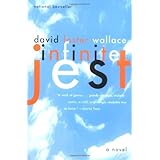
Average Reviews:

(More customer reviews)David Foster Wallace is a genius, and he knows it. But unlike other geniuses that you might know, he never tries to make you feel dumb. He just wants you to understand the same things that he does, so occasionally you'll feel out of your depth. But he's also a gifted writer, so odds are that you *will* come out understanding him. And what he's saying is brilliant, so you'll feel like a better person for it.
Wallace has been described as ``postmodern", a word that seems to get smacked onto anything written after World War II. I don't see it. To me, postmodernism involves a few things: 1) irony, in liberal doses (e.g., DeLillo's _White Noise_); 2) a continuous awareness that we're *reading a book* and that there's an author talking to us, and that the characters are under his control (e.g., anything by Kurt Vonnegut); 3) self-reference, sometimes to the point of disorienting involution (e.g., Wallace's story ``Westward The Course Of Empire Makes Its Way" from his book _Girl With Curious Hair_ - and that story is, notably, a spoof of postmodernism). This may be an overly conservative definition of postmodernism, but the word's overapplication justifies some conservatism.
_Infinite Jest_ is not postmodern; it's just a great story with beautifully constructed characters. It is a book about a movie that is so addictive that anyone who starts watching it has no choice but to keep watching it forever - foregoing food, water, and sleep, and suffering as much pain as is necessary to keep watching. The movie itself is, to paraphrase a friend, an uber-McGuffin (I'm never sure whether I've spelled that right) - an object that never gets clearly explained, but around which the plot coheres.
The movie itself is not the main point of the book. _Infinite Jest_ is a novel about American addictions: television, drugs, sex, fame, and indeed the American need to be addicted to something. An addiction to addictions. Wallace summarizes the book's mood well when he says,
``There's something particularly sad about it, something that doesn't have very much to do with physical circumstances, or the economy, or any of the stuff that gets talked about in the news. It's more like a stomach-level sadness. I see it in myself and my friends in different ways. It manifests itself as a kind of lostness. Whether it's unique to our generation I really don't know."
(...)
The main sign of Wallace's genius - and yes, I mean that word with all it entails, content in the knowledge that it is overused but that it fits here - is that he can make us feel this gut-level sadness without even appearing to work at it. Heavy use of irony can make you feel that there's some deeper, unseen, lurking gloominess about the world, and for that reason it's the easy way out. Ditto self-reference, which after a while is dizzying and confusing. Wallace is too brilliant a writer to take any of the easy postmodern routes. He's just written a great story with an unpleasant underlying mood. It's been a long time since I've read a book of such masterful subtlety.
It has all the classic aspects of a great novel: characters whom the reader *understands*, a compelling story that edges inexorably toward an uncertain ending, a gut-level mood, and a habit of dispensing brilliant toss-offs so suddenly that the reader can't help but gasp. For instance, see the attached text file containing Wallace's future-retrospective explanation of why videophones failed.
My first inclination was that this book - weighing in at over a thousand pages, including hundreds of footnotes (some of which have their own footnotes) - needed an editor. And it may, at points. But there's very little chaff amongst the wheat: the book's heft serves at least three purposes:
1) To build characters, slowly and methodically. One of Wallace's flaws is that his characters' dialogue - particularly that of his youthful protagonist and tennis prodigy, Hal Incandenza - doesn't sound genuine. It sounds like Wallace talking through 17-year-olds, not 17-year-olds who've been transcribed. I think Wallace realizes this, which is why most of his character development comes through narration.
2) To dump out the contents of Wallace's swirling brain. He has so much to say, and he seems to want to get it all down on paper in this one book. Less profound thoughts from a less talented author might have left me screaming for an editor, but they didn't do so here.
3) To structure the book as a conversation. Reading this book, one feels as though one is talking directly with Wallace. More often than not, his sentences will contain heavy Latinate words like ``epicanthic" just a short distance from the conversational stammerings ``like" and ``and so but". Again, had a lesser writer written these words, I would have edited the book myself, filling the margins with red pen.
The book's length will discourage all but a few readers, but it handsomely rewards the patient.
Click Here to see more reviews about: Infinite Jest: A Novel
Click here for more information about Infinite Jest: A Novel

0 comments:
Post a Comment